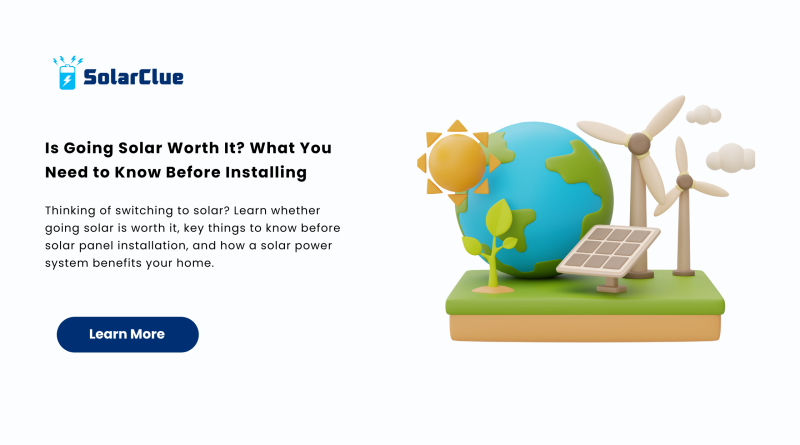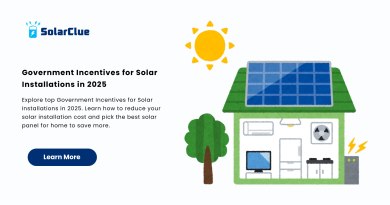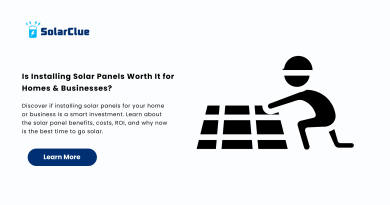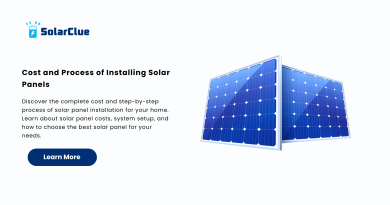Is Going Solar Worth It? What You Need to Know Before Installing
The world is rapidly moving towards cleaner energy, and many homeowners are asking, is going solar worth it? What You Need to Know Before Installing. The answer depends on various factors such as your location, energy usage, and long-term savings. In this blog, we’ll explore what you need to know before a solar panel installation, the pros and cons, cost considerations, and how to make the most of your solar power system investment.
Table of Contents
- 1 Understanding the Basics of Solar Energy
- 2 Why Homeowners Are Turning to Solar
- 3 Key Factors to Consider Before Going Solar
- 4 How Much Can You Really Save?
- 5 Common Misconceptions About Going Solar
- 6 The Environmental Impact of Solar Energy
- 7 Is It the Right Time for Solar Panel Installation?
- 8 Final Thoughts: Is Going Solar Worth It?
- 9 FAQs
Understanding the Basics of Solar Energy
Before diving into the benefits, it’s essential to understand what solar energy is. Solar panels capture sunlight and convert it into electricity using photovoltaic cells. This electricity can either power your home directly or be stored in batteries for later use. A standard solar panel for home use can significantly reduce reliance on grid electricity, especially during peak sunlight hours.
Why Homeowners Are Turning to Solar
The popularity of solar energy is not just a trend—it’s a practical shift toward sustainability and cost-efficiency. Here’s why many people are choosing solar panel systems:
-
Reduced Electricity Bills: You can save thousands over the years.
-
Government Incentives: Subsidies, net metering, and tax benefits lower upfront costs.
-
Increased Property Value: Homes with solar installations are more attractive to buyers.
-
Low Maintenance: Once installed, solar panels require minimal upkeep.
Key Factors to Consider Before Going Solar
1. Location and Sunlight Availability
Solar works best in areas that receive a good amount of sunlight throughout the year. If your home gets consistent sun exposure, solar panel installation will likely provide maximum efficiency. However, even in cloudy regions, modern panels can still generate power efficiently.
2. Roof Space and Condition
Not every roof is suitable for solar panels. Ensure your roof has enough unobstructed space and is in good condition before investing. Flat and south-facing roofs generally yield the best results.
3. Type of Solar Panel for Home
There are different types of solar panel for home use like monocrystalline, polycrystalline, and thin-film panels. Each varies in efficiency, cost, and space requirement. Choosing the right type depends on your budget and energy goals.
4. Upfront Costs vs. Long-Term Savings
The initial cost of a solar power system can be significant. However, with available government subsidies and decreasing solar panel prices, the return on investment is quicker than ever. Most users recover their costs in 5–7 years and then enjoy nearly free electricity for 15–20 more years.
5. Net Metering and Grid Connection
With net metering, you can send excess electricity back to the grid and get credited for it. This further enhances savings and reduces dependency on batteries. It’s crucial to check whether your area supports this policy.
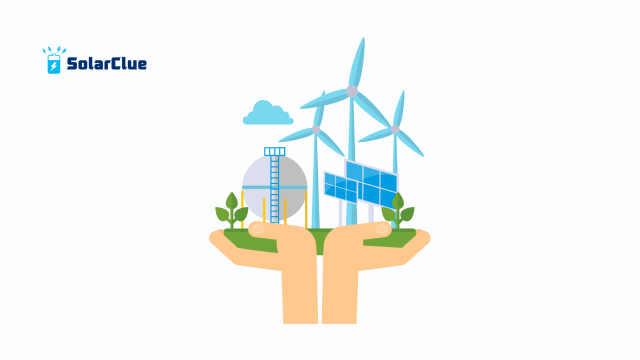
How Much Can You Really Save?
Savings from solar panel installation vary depending on your energy consumption, panel efficiency, and electricity tariff. On average, an Indian household can save up to ₹1,000 to ₹3,000 per month on electricity bills. Over a 25-year period, this can amount to lakhs in savings, making solar a wise long-term investment.
Common Misconceptions About Going Solar
“Solar Only Works in Hot Climates”
Solar panels rely on sunlight, not heat. They actually work better in cooler temperatures with ample sunlight.
“Solar Panels Are Too Expensive”
While the initial cost may seem high, with incentives and financing options, solar panel systems have become more accessible than ever.
“You Need Battery Storage for Solar”
Not necessarily. If you’re connected to the grid and have net metering, you can benefit from solar without batteries. However, batteries can be useful during outages.
The Environmental Impact of Solar Energy
By switching to solar power, you reduce your carbon footprint significantly. A typical solar panel for home can offset several tons of CO₂ emissions every year. That’s equivalent to planting hundreds of trees annually.
Is It the Right Time for Solar Panel Installation?
Yes, now is an excellent time. With rising electricity prices and growing awareness about sustainability, installing a solar power system is a smart decision. Plus, current government incentives won’t last forever—making early adoption even more beneficial.
Final Thoughts: Is Going Solar Worth It?
If you’re looking to reduce your electricity bills, add value to your property, and make a positive environmental impact, then going solar is absolutely worth it. But like any investment, it’s important to evaluate your specific needs and do thorough research before proceeding. Whether you’re interested in solar panel installation for residential or commercial use, now is the time to take that step toward a cleaner, greener future.
Still wondering where to begin your solar journey? Explore top brands, get personalized guidance, and find everything you need at SolarClue.com or read more expert solar insights at blog.solarclue.com. Your brighter future starts here.
FAQs
Q1: Is solar energy reliable during cloudy days?
Yes, solar panels can still produce electricity during cloudy days, though at reduced efficiency. Quality panels are designed to function in varying weather conditions.
Q2: How long do solar panels last?
Most solar panels come with a 25-year performance warranty, and many last even longer with proper maintenance.
Q3: Can I run my entire home on solar power?
Yes, with the right system size, you can power your entire home using solar, especially if you incorporate battery storage or net metering.
Q4: Are there financing options for solar panel installation?
Yes, many banks and NBFCs offer solar loans with easy EMIs. Government schemes may also support partial funding or interest subsidies.
Q5: What maintenance is required for solar panels?
Solar panels require minimal maintenance—just regular cleaning and occasional inspections to ensure optimal performance.
Let your solar journey begin with confidence—visit SolarClue.com or blog.solarclue.com and power your home the smart way!

